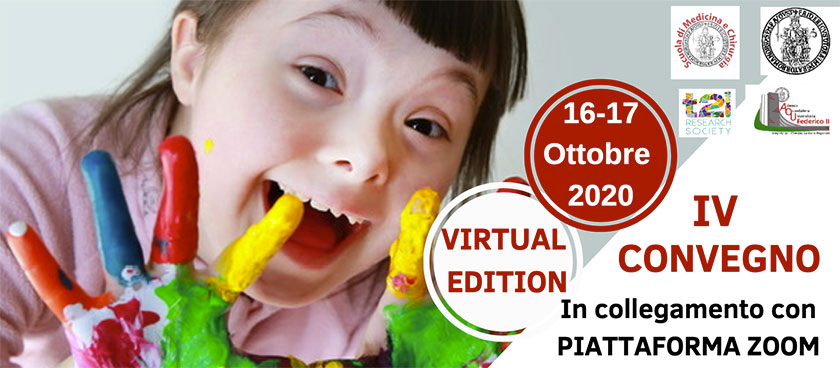It is in its fourth edition the conference “Down’s syndrome: from diagnosis to therapy” which will be held this year by telematics on 16 and 17 October 2020.
This conference, which has become over the years the most significant appointment in Italy to discuss this well-known chromosomal pathology, the first of which was understood in 1958, is organized by the Department of Molecular Medicine and Medical Biotechnology, the School of Medicine and Surgery and the University Hospital Federico II. In particular, is the research group of Professor Lucio Nitsch, for many years engaged in the study of molecular mechanisms through which the trisomy of chromosome 21 causes the clinical signs of Down syndrome, which has involved all major Italian research centers working on this issue by organizing a rich and qualified program.
New: Session in English
The most important novelty of this year is a session in English, open to the international scientific community and organized, under the auspices of the International Society T21RS, with the collaboration of highly qualified European colleagues. This is meant to be an international window of a national conference to underline the importance of cooperation without frontiers in all fields of scientific research.
Program
The rest of the conference is organized in 6 different sessions. The first one will focus on the molecular and cellular basis of Down’s syndrome, the genes potentially responsible for specific functional alterations, the alterations of neuronal development and new methodological approaches to study them. The second session will deal with the innovative aspect of the alterations of molecular profiles that are detected in the syndrome involving metabolites, proteins and RNA and that open new opportunities for monitoring and therapeutic approach. The third session is dedicated to Alzheimer’s disease, which occurs extremely frequently in Down’s syndrome, in search of new biomarkers and new therapeutic targets.
The discussion on Alzheimer’s disease will be followed, in the fourth session, by a brief excursus on some of the other diseases associated with Down’s syndrome: leukemia, celiac disease, periodontitis and, topical issue, COVID-19. This session will be closed by a reflection on the use of artificial intelligence as a new methodology to face with extraordinary effectiveness the challenges of acquiring knowledge and skills that the future proposes us. The fifth session will be dedicated to pharmacological and nutritional therapeutic interventions: new molecules, but also new nutritional regimens, already used in humans or, still experimentally, in mice, both in prenatal and neonatal age.
The last session will still be dedicated to treatments, not pharmacological type, that address issues related to psycho-motor disabilities, the timing and methods of intervention and the involvement of the family community. The conference will close with a round table that will include a meeting between researchers, associations and family members of Down people to discuss the objectives of the scientific community, the expectations of family members and how to create, on these issues, an effective synergy useful to promote in our country a scientific research increasingly expanded, incisive and productive.
General Information
The conference is free and open to all. Although it is mainly addressed to a wide audience of professionals in the field of research and therapy of Down’s Syndrome, the participation of students, staff in training and, especially for the most popular sessions, Associations and relatives of people with Down’s Syndrome is desired.
All material and information on how to participate are available on the website of the Department of Molecular Medicine and Medical Biotechnology.

